The best FREE educational resources online and tips for homeschooling
Schools are officially closing...
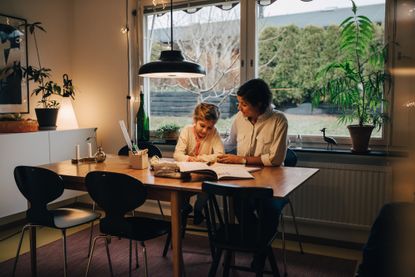
The coronavirus pandemic is growing day by day, and since the 20th March, schools have been officially closed in the UK.
The news inevitably left parents and school-children feeling unsettled, with many having to face the reality of home-schooling their kids for the foreseeable future. In fact, it's even been reported that the world's most famous royal children, Prince George and Princess Charlotte, are set to be home-schooled during the pandemic.
As such, you may be wondering how best to continue your kid's education from home, to ensure that they don't miss out - especially if you're working from home and can't have grandparents around to help out with childcare.
Firstly, it's important not to put any undue pressure on yourself, to exactly emulate the school experience.
Noel Janis-Norton, Director of ‘Calmer, Easier, Happier Parenting and Teaching’, bestselling parenting author, speaker and advisor, said, "Here’s something that should help you feel better. Did you know that studies have shown that out of a typical six-hour day in primary school, there are only about two hours of focused academic learning taking place?
"So, if you schedule two hours of homework (in the morning when minds and bodies are rested), or three hours for teens, you can relax and let them entertain themselves in the afternoon."
What resources and tips can help then if you are currently home-schooling your children?
GoodtoKnow Newsletter
Parenting advice, hot topics, best buys and family finance tips delivered straight to your inbox.
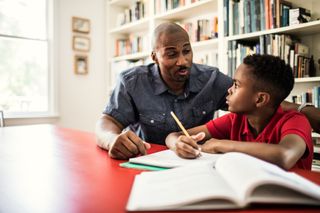
Make the most of free educational resources online
Even though you might not be able to stick exactly to your kids normal school curriculum if home-schooling them, there are some valuable educational tools out there you can really make the most of at the moment.
If you're keen to stay closely to what they would have been learning at school, the BBC Bitesize website is a really brilliant resource. It allows you to drill down into the right tools for your child's school year, and even lets you pick a subject area to focus on - from English to Geography to Maths and History. It caters to school children all the way from primary school to post-16, so will work whatever age your kids are.
What other websites can be useful while homeschooling?
- Cenutury - in order to help during the coronavirus pandemic, the website has a section for parents, and it aims to identify gaps in knowledge, address misconceptions and personalises content for your children.
- Oxford Owl - created by Oxford University Press, it has a specific section dedicated to home-schooling, including advice for parents, as well as a range of educational games and activities and a library for 3 - 11 year olds.
- Make Me Genius - although it's an American website, this website has a huge range of super valuable videos, designed for younger children. Here, they can learn about the solar system, pollination, and primary colours, for example, with fun, interactive videos.
- BBC History for Kids - this is a great resource for learning all about the past in an easy, digestible way, from Ancient Egypt to the Magna Carta.
Hannah Titley, who runs the UK’s first professional home-schooling group The Golden Circle, and Home Schooling Association UK, also shared her top recommendations for online schooling resources.
She recommended:
- Memrise - a language-learning platform that could incredibly helpful for anyone studying the languages.
- Quizlet - which makes simple learning tools such as games and flashcards for a variety of subjects.
- Seneca - providing free revision on exam-board specific subjects, for A Level, GCSE, and KS3 and K2S students.
- Twinkl - an online education publisher, providing access to handy lesson plans, interactive activities and assessments.
'Not all learning takes place in the classroom'
We all recognise that a vital part of our children's learning and development isn't just sitting in a classroom reading a book - it's about getting out and experiencing everything the world has to offer too.
Of course, social interaction needs to be limited during the pandemic, but getting outside whenever you can is a great way to learn - and getting some fresh air can be vital for yours and your kids mental health.
If you're teaching your little ones about photosynthesis, maybe go out into the garden and take a look at the leaves, or ask them to try and identify any flowers they see. It's still okay to head out on walks too, as long as you stay two feet away from others, so try and point out the different trees and landscapes you see if you do. It could also be a fun time to teach them about survival skills, such as building a fire or using a compass.
The mental health charity Mind advises during this time, "Get as much natural light as you can. Spend time in your garden if you have one, or open your front or back door and sit on the doorstep."
Embrace the opportunity to explore creativity
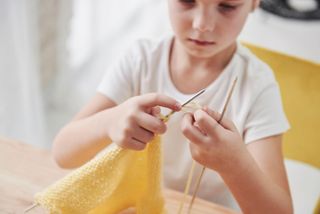
When children are at school, there may be a smaller window of opportunity for arts and crafts, especially as they get older and start focusing more on exams and their future.
But home-schooling them means that you can a reserve a little more time for them to get creative. After all, there are plenty of amazing benefits.
Many studies have revealed that working on craft projects helps develop children's fine motor skills, such as hand-eye coordination and and dexterity, as well as building on their creativity which could prove beneficial in later life. Or, what not take some extra time to tecah them some new and basic cooking skills?
Don't be afraid to call in some extra help
Alex Dyer, an ex-teacher and founder of online tutoring platform Tutor House, explained that there's no need to feel like you need to do home-schooling all by yourself.
It's okay to rely on the guidance of your school's teachers, particularly if your children are a bit older and learning more advanced things. He said, "Schools and teachers will be sharing information with you, as the parent, on what your child is currently learning and what they should be learning over the next month or so. Stick to it and ask questions.
"Teachers will still be working during this time, and many schools will create a dedicated communication platform for parents and students. This will become invaluable for you while monitoring your child’s home schooling, so make sure you are keeping up to date with what’s being shared and communicated within the school’s community."
There are also various online tutoring servies that can help. Tutor House for example are offering online A-Level/GCSE exam preparation courses at a reduced rate, during the COVID-19 outbreak.
Dr Leo Evans, owner of Tavistock Tutors, who also offer online tutoring, said, "As a parent, we have many skills but a thorough knowledge of the curriculum may not be one of them, and it’s important that during this time, our children don’t fall behind. So investing in an online tutor, focusing on various subjects, even once per week will keep their knowledge and education topped up. An online tutor will also give you a break, and give your child someone else to engage with."
Set a home-schooling routine as best you can
Even if your children aren't going to school, it's important to still maintain a sense of normal routine, both for productivity and for your kids mental wellbeing.
Alex said, "This doesn’t have to be a rigid timetable, but set up a structure with daily goals to achieve, giving children something to aim for and reward them when the goals are reached to keep them motivated.
"It may be beneficial to try and mimic the child’s school day as much as possible. For example, breakfast at 8am, first home lesson at 9am, lunch at 1pm, with finishing off the learning day at 3pm."
Noel also said that it could be helpful to focus schoolwork in the morning only though, as that is when children are generally most focused.
She said, "Children can feel very anxious and weighed down by the thought of lots of homework, especially if they are allowed to keep putting it off until later and later in the day. Anxiety makes many children irritable and demanding, which of course irritates parents. But we need to remember that this reaction is not their fault.
"You can remedy this problem by making a realistic schedule and sticking to it. Academic work and household chores are best tackled in the morning, when minds are fresh and willingness is usually highest. Make sure that the homework is suited to your child’s skill level, or else she will feel frustrated, and it will undermine her confidence."
But don't forget that all-important down-time
While it might be tempting to keep working while the kids are paying attention, it's not the most useful thing for everyone. Alex said, "Breaks are just as important as study periods for resetting focus, keeping kids happy and grownups sane. Aim for a 15-minute ‘snack’ break mid-morning, and a good 45 minute to an hour lunch break in the afternoon."
Maintaining some rules from school can also be helpful for kids to create a separation between work-time and relaxing time. "Just like in school, phones will only be a distraction so try to get your children to put them to one side when going through schoolwork, and TV’s should remain off throughout the day," the team at Tutor House said.
Remember to keep socialising as best you can
We might not be able to send our kids to school where all their friends are, or head out on weekend play-dates, so it's important to keep socialising where you can. Dr Leo explained, "When children are in classrooms, they benefit from social development and interaction. They may not have this benefit at home.
"So it’s important that you consistently interact with them, give them regular breaks and an hour lunch, and talk to them about what they are learning at the end of the day. During a time of self isolating, seeing friends isn’t an option, but online calls will help to break up the day, tackle boredom and will keep them on track."
Amy is Senior Digital Writer across Woman & Home, GoodTo and Woman, writing about everything from celebrity news to health, fashion and beauty features. When she isn't obsessing over the latest dress drop from Marks & Spencer, you'll most likely find Amy out running, or with a cup of tea in hand ready to dive into a gripping new Netflix series.
-
 Compromising may be killing your relationship - here are 5 ways to reach healthy compromises, according to relationship expert
Compromising may be killing your relationship - here are 5 ways to reach healthy compromises, according to relationship expertCompromising isn't always the best way to keep the peace in a relationship
By Charlie Elizabeth Culverhouse Published
-
 Best interactive pets for kids: 15 gift ideas for children of all ages
Best interactive pets for kids: 15 gift ideas for children of all agesFrom puppies to axolotls, take a look at our selection of the best interactive pets you can buy that are sure to be a hit with little animal lovers
By Sarah Handley Published
-
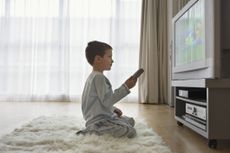 When are the BBC education programmes on TV during lockdown? How kids can watch from home
When are the BBC education programmes on TV during lockdown? How kids can watch from homeBy Lucy Buglass Published
-
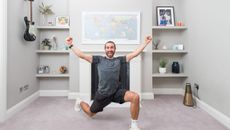 Watch Joe Wicks lockdown workouts: Where and how to watch The Body Coach’s PE sessions for children
Watch Joe Wicks lockdown workouts: Where and how to watch The Body Coach’s PE sessions for childrenFancy getting a second round of Joe Wicks lockdown workouts? Here's what the Body Coach is up to during the second lockdown...
By Amy Hunt Published
-
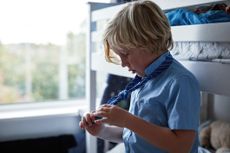 Laundry expert reveals how to keep school uniforms COVID-free
Laundry expert reveals how to keep school uniforms COVID-freeBy Lucy Buglass Published
-
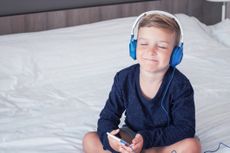 Relaxing music for kids to listen to if they're feeling stressed out and anxious
Relaxing music for kids to listen to if they're feeling stressed out and anxiousIt can help everyone...
By Amy Hunt Published
-
 How to keep your kids entertained at home when you're self-isolating
How to keep your kids entertained at home when you're self-isolatingIt can be tricky...!
By Amy Hunt Published
-
 'Kids have been expelled' Parents take to Twitter to share their homeschooling experiences so far....
'Kids have been expelled' Parents take to Twitter to share their homeschooling experiences so far....By Tanya Russell Published
-
 Thought you had it bad? Pregnant mum with 21 kids reveals how she's coping with homeschooling
Thought you had it bad? Pregnant mum with 21 kids reveals how she's coping with homeschoolingCould you handle teaching 21 kids at home?
By Emmie Harrison-West Published
-
 Cosmic Kids Yoga: the mindfulness app for children
Cosmic Kids Yoga: the mindfulness app for childrenBy Grace Walsh Published